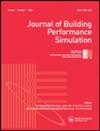SIREN – smart ventilation for infection risk mitigation and HVAC energy efficiency: a case study amid the COVID-19 pandemic
IF 2.3
4区 工程技术
Q2 CONSTRUCTION & BUILDING TECHNOLOGY
引用次数: 0
Abstract
The COVID-19 pandemic has underscored the need for effective ventilation control in public buildings. This study develops and evaluates a smart ventilation control algorithm (SIREN) that dynamically adjusts zone and system-level HVAC operation to maintain an acceptable COVID-19 infection risk and HVAC energy efficiency. SIREN uses real-time building operation data and Trim & Respond control logic to determine zone primary and system outdoor airflow rates. An EnergyPlus and CONTAM co-simulation framework was developed to assess its performance across various control scenarios and US climate zones. Results show that SIREN can flexibly control infection risk within a customized threshold (e.g. 3%) for every zone, while traditional controls cannot. At the building level, SIREN’s HVAC energy consumption is comparable to a fixed 70% outdoor airflow fraction scenario, while its infection risk is lower than the 100% outdoor airflow scenario, illustrating its potential for safe and energy-efficient HVAC operation during pandemics.SIREN——用于降低感染风险和暖通空调能效的智能通风:COVID-19大流行期间的案例研究
2019冠状病毒病大流行凸显了公共建筑有效通风控制的必要性。本研究开发并评估了一种智能通风控制算法(SIREN),该算法动态调整区域和系统级暖通空调运行,以保持可接受的COVID-19感染风险和暖通空调能效。SIREN使用实时建筑运行数据和Trim & response控制逻辑来确定区域主气流和系统室外气流速率。开发了EnergyPlus和CONTAM联合仿真框架,以评估其在各种控制方案和美国气候带中的性能。结果表明,SIREN可以灵活地将每个区域的感染风险控制在一个定制的阈值内(例如3%),而传统的控制方法则无法做到这一点。在建筑层面,SIREN的暖通空调能耗与室外气流比例固定为70%的情况相当,而其感染风险低于室外气流比例为100%的情况,这表明其在流行病期间安全节能的暖通空调运行潜力。
本文章由计算机程序翻译,如有差异,请以英文原文为准。
求助全文
约1分钟内获得全文
求助全文
来源期刊

Journal of Building Performance Simulation
CONSTRUCTION & BUILDING TECHNOLOGY-
CiteScore
5.50
自引率
12.00%
发文量
55
审稿时长
12 months
期刊介绍:
The Journal of Building Performance Simulation (JBPS) aims to make a substantial and lasting contribution to the international building community by supporting our authors and the high-quality, original research they submit. The journal also offers a forum for original review papers and researched case studies
We welcome building performance simulation contributions that explore the following topics related to buildings and communities:
-Theoretical aspects related to modelling and simulating the physical processes (thermal, air flow, moisture, lighting, acoustics).
-Theoretical aspects related to modelling and simulating conventional and innovative energy conversion, storage, distribution, and control systems.
-Theoretical aspects related to occupants, weather data, and other boundary conditions.
-Methods and algorithms for optimizing the performance of buildings and communities and the systems which service them, including interaction with the electrical grid.
-Uncertainty, sensitivity analysis, and calibration.
-Methods and algorithms for validating models and for verifying solution methods and tools.
-Development and validation of controls-oriented models that are appropriate for model predictive control and/or automated fault detection and diagnostics.
-Techniques for educating and training tool users.
-Software development techniques and interoperability issues with direct applicability to building performance simulation.
-Case studies involving the application of building performance simulation for any stage of the design, construction, commissioning, operation, or management of buildings and the systems which service them are welcomed if they include validation or aspects that make a novel contribution to the knowledge base.
 求助内容:
求助内容: 应助结果提醒方式:
应助结果提醒方式:


